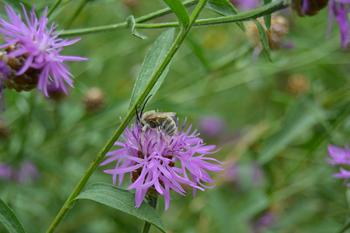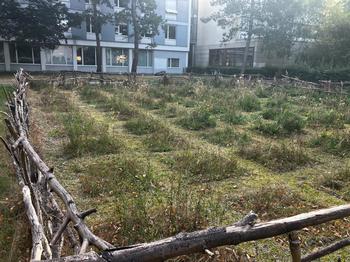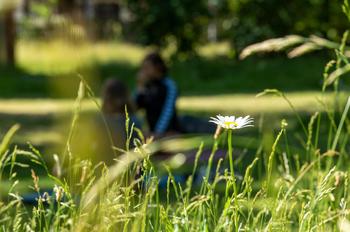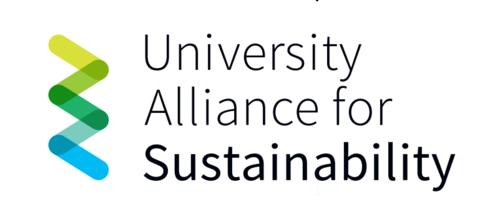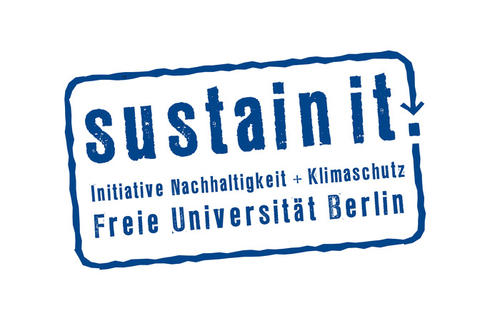Research and Teaching on the Blooming Campus
The Long-Horned Bee of the Knapweed, seen here on a knapweed flower near the Hahn-Meitner Building in Dahlem, is found in Germany almost exclusively in Berlin and Brandenburg. Image source: Blooming Campus
Image Credit: Blühender Campus
Gary Biodiversity Experiment at the OSI Bibliothek
Image Credit: Blühender Campus
Yoga on the Blooming Meadow
Image Credit: Sophie Lokatis
An Observational Study on Wild Areas
A faunal survey conducted in 2019 revealed a more than tenfold increase in insects within just one season across 10 areas on campus that were mowed only once. The particularly large, contiguous areas near Van't-Hoff-Straße even showed an approximately 18-fold increase after one season and nearly a 40-fold increase in insects after two years. Protected and endangered species were almost exclusively found in the newly created flowering areas. These areas are home to many, sometimes rare, species of wild bees, such as the knapweed long-horned bee and the pygmy carder bee. Many grasshopper species, including the beautiful Italian locust, as its name suggests, find a habitat in these newly created areas. Ground-nesting wild bees and digger wasps, including *Sphex funerarius* (the largest German digger wasp), nest in the slightly more open areas. Since the start of the project, we have been cooperating with the Fritz-Haber-Institut of the Max Planck Society, adjacent to our areas in Dahlem, which has managed its own area with a scythe since 2020. Since 2021, large areas on the Geo-Campus Lankwitz and the Veterinary Medicine Campus in Düppel have been mowed only 1-3 times a year with a bar mower and are maintained by local sustainability groups.
A Field Experiment for Biodiversity Conservation and Improved Soil Drought Resistance
The field experiment, launched in March 2023 in front of the Library for Social Sciences and Eastern European Studies, combines the themes of the Blooming Campus with research. On one of our areas, an experiment was initiated by the AG Rillig, Ecology of Plants, at the suggestion of library staff. It consists of 70 experimental units in which the soil has been treated with biochar, clay, mycorrhiza, silicate, or compost, either individually or in combination. The seed mix sown was designed to provide food for wild bees and other pollinators. This research project is the result of collaborative work by many stakeholders and contributes to dissertations, master’s theses, and bachelor’s theses. During the final year of the experiment, the pollinator visitation rate will be measured as part of a course involving 200 students from the basic Ecology module.
Biodiversity and Human Well-Being
Within the framework of the Multispecies Living Lab, research is now also being conducted on the impact of biodiversity on human well-being! Urban ecologist Prof. Dr. Tanja Straka and psychologist Dr. Jan Keller have teamed up to study how interaction with wildlife affects students.
Teaching and Theses
The species-rich meadows are also utilized in teaching. In the advanced module Organismic Biology, for example, insects are sampled and identified, while the ABV module Campus Nature focuses solely on species groups, conservation, and public outreach on Freie Universität Berlin’s campus.
Research projects and theses can also be conducted in various departments and disciplines related to the Blooming Campus. Examples of completed bachelor’s and master’s theses include topics in biology (e.g., flowering spectra on spontaneous vegetation areas and newly sown areas of the Berlin Pollinator Strategy, in cooperation with the project "Berlin in Bloom - More Bees for Berlin"), education sciences (e.g., educational formats in nature and environmental education during the pandemic), and ethnography (e.g., human-nature interaction and the concept of wilderness).

